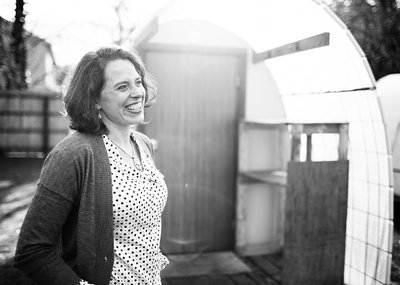
When Pastor Erin A. Martin first arrived at Wesley United Methodist in 2006 to fill a part-time staff role, she says the congregation was aging and in “self-preservation mode.”
“They were more worried about keeping the lights on and filling the pews and not necessarily looking outside of themselves,” Martin says. “What I’ve tried to do in my leadership is to help them understand that they’re not dead yet; God isn’t finished with us yet, and in many ways we’re coming back to life by serving those outside of ourselves.”
Her voice is full of conviction. Her body language is expressive: Martin’s eyes go wide, and her gestures mirror her feelings — elation, determination, thoughtfulness — as she smiles, frowns, wrinkles her nose, folds her hands under her chin. Outside her office sit tables full of wreaths, Christmas cookies, mistletoe and holly berries from Wesley’s Holiday Bazaar, a sure sign that the season of Advent has begun in earnest.
Martin, who became ordained at and attended Duke Divinity School in North Carolina, took over as pastor at Wesley in 2009 and started envisioning a way to enliven and invigorate her congregation. These changes manifested in their governance, discipleship and the way that they helped those in need in the Eugene community.
Now, Wesley is part of the Conestoga hut program, giving shelter to the unhoused with two huts on its church campus near Coburg Road. Wesley also has its own program of Wesley Assisted Veterans in Eugene (WAVE) and the church fundraises for Opportunity Village Eugene and provides shelter at the church for families two weeks out of the year through First Place Family Center.
Martin says the church has shifted in the way it gives to those in need as part of a larger movement to stay relevant in communities that have become more secular, where Christianity is no longer “the norm” or appropriate to assume of someone.
“We had built this bridge, and then the cultural tide shifted and changed and basically moved the river,” Martin says of the role that churches traditionally held in post-World War II America. “But we were still over there tinkering with the bridge. And then we live into the criticism that the church has become irrelevant, that the church has become disconnected from the issues, needs and desires of our culture.”
One way that cultural shifts moved the river, Martin says, is the way in which people give.
“Now it’s much more about face-to-face engagement, sharing stories. It’s a lot easier to write a check than to shift your priorities around so that you’re making a steady commitment that has an impact,” Martin says. “It demands more of us.”
While the church has participated in the First Place program and in various food drives over the years, programs like WAVE and the Conestoga huts are a more recent development during Martin’s tenure. The idea for WAVE first came about when Ron Cole, a member of the Wesley congregation since 1971, decided the church should help homeless veterans in some capacity after reading an article saying that veterans were unemployable.
“I knew it not to be accurate,” Cole says. “In fact, one of the great attributes that veterans have as far as being employable is they are very loyal, disciplined and work great as a team.” Cole served in the U.S. Army during the Vietnam War on the border between Vietnam and North Korea.
Cole says the WAVE program provides bus passes for homeless vets to let them visit work and home opportunities, helps them with rent deposits or unexpected rent increases and supplies move-in kits to newly homed vets with basic house supplies: a skillet, toilet paper, laundry basket, etc. According to Martin, WAVE, which partners with HUD-VASH (Housing and Urban Development-Veterans Affairs Supportive Housing) and VetLift, provided 50 move-in kits this year to 50 vets who moved off the streets.
Now that the Conestoga hut program and WAVE programs have been in effect for a year or more, Martin says she’s seeing a culture of giving that begets more giving.
“What we’re discovering is the more that we step out and are doing good, the more we understand that people want to return that goodness.” Martin explains that one of their Conestoga residents, whom Martin calls an “exemplary gentleman,” has a botany degree and regularly maintains their Memorial Garden for them, weeding, raking and sweeping.
Another example is a two-way relationship with Willagillespie Elementary School down the road, volunteering and providing food for kids who are on free lunch program to take home on weekends. In return, the school offered baked cookies for the church’s Holiday Bazaar. “It feels very reciprocal rather than one-sided,” Marin says. “It’s much more humbling and empowering for us to be in the position of being receptive.”
Although Wesley partners with local organizations, runs its own programs, donates and fundraises, Martin doesn’t consider it to be a “banner church for homelessness issues,” but rather points to churches more centrally located, like First United Methodist and First Christian. Because Wesley doesn’t have the unhoused regularly coming in from the streets, it can seem like an issue that’s relegated to downtown.
“A lot of people who live in this area don’t assume that homelessness is here in this neighborhood,” Martin says. “I think people came out here to kind of escape some of that. So in that way we’re not necessarily on the front line. But for us, it really doesn’t matter where you are. Even though we find ourselves in a neighborhood that prides itself on its affluence, it’s not optional.”